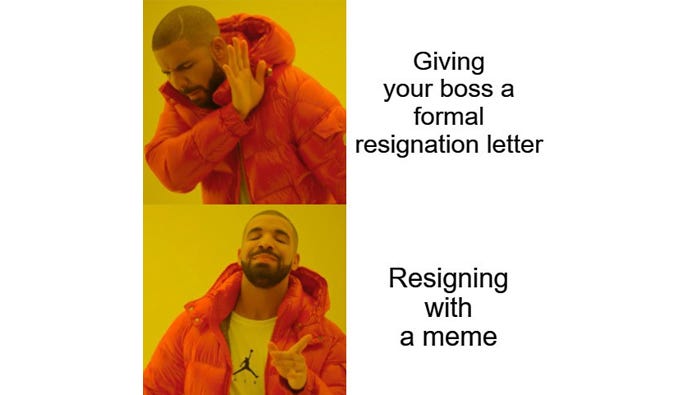What To Expect When You’re Expecting…To Resign — 9 More Tips For Leaving Your Job (Don’ts)
Part 2 of the “What to Expect” series focuses on the “Don’ts,” or things that you should avoid when resigning from a position. Read Part 1…
Part 2 of the “What to Expect” series focuses on the “Don’ts” or things that you should avoid when resigning from a position. Read Part 1 here.
Don’t drag everyone else down
You have your reasons for leaving and that’s all well and good, but don’t ruin the experience for everyone else. It is likely that you are the only one leaving, so don’t spend your time bad-mouthing the company, people at the company, or airing grievances.
Instead, spend some time helping others focus on the positives and the things that you are sad to leave behind. Or just don’t say anything at all. It’s like the saying goes, “if you can’t say anything nice, maybe just keep your yapper shut.”
Don’t hold back in your exit interview
In most companies, especially those with an HR department, it is likely that you will be asked to participate in an exit interview. Exit interviews are generally 30 minutes to an hour and focus on “what could the company be doing better,” and other questions on why you decided to leave.
Have a plan for the items you would like to discuss in the exit interview and don’t hold back when it is time to give feedback. This is the one time during your resignation where putting everything out there is beneficial, but try to do so in a constructive manner. Writing it down ahead of time will help prevent you from meandering.
Don’t dump everything out and point at it; instead, give reasons why you were unhappy with how something was handled. The more context you give, the more likely others will benefit from your feedback.
You can follow the model of “what I saw was X, what I wanted to see was Y,” to try and give constructive feedback.
Don’t openly steal people from the company
In the “Do’s” (read more here) we discussed reading through the employee handbook to understand how to resign. Once again, you can turn to the employee handbook to understand any non-compete or non-solicitation agreements you agreed to.
Most companies toss in a one-year period where you aren’t allowed to poach clients or employees. This is enforceable in most states, other than California, and typically looks like a cease and desist letter if you start poaching folks, but the better route is to just not do it.
If former colleagues are actively applying to your new location of employment, stay out of the conversations and inform your new employer about your non-solicitation agreement. You can’t prevent others from applying, but don’t intentionally steal.
Don’t expect people to commiserate with you
Just because you’re having a bad time doesn’t mean everyone else is. In your final weeks, don’t spend time looking for folks to commiserate with and validate how you’re feeling.
Especially if it’s something you’ve complained about before, it’s likely co-workers will roll their eyes and remember you as the person who “just couldn’t let it go.”
Unlike President Thomas J. Whitmore in Independence Day, sometimes it’s better to go quietly into the night.
Don’t gloat
“Oh man, I’m so glad to get out of here. You all are chumps.” Don’t be this person. Thankfully I don’t know anyone like this, but please don’t let it be you.
There’s an intriguing phenomenon called the “Halo Effect,” and how you act in your final two weeks can give the folks you work with a good or bad final impression that will stick with them for years to come. Gloating will likely put you in the latter camp.
Don’t expect a parade
Even if you spent time prior to putting in your two weeks commiserating or complaining with others, they’re not necessarily going to do backflips when you announce you are leaving. Others may not even be considering a departure and were just venting.
Regardless, don’t feel like you’ve earned a going away party. The folks you are leaving behind still have a job to do and you are not the center of their world. Go about your business, finish your work and leave quietly. It’s also acceptable to invite a few folks out and have a final catch-up but refer to the previous note.
Don’t spend the time complaining or trying to get people to take your side on topics. Talk about the fun you had or the projects you were proud to be a part of with that group.
Don’t expect to tell everyone personally
In leaving three office jobs throughout my career, each has been very different. At one, I announced my resignation at a happy hour with my boss’ support. At another, my direct reports were quickly brought into a room and told without me knowing. In my most recent career change, I helped put together a communication plan and told a few select people first and then announced more broadly in groups.
Each company will take your resignation differently, so don’t take it personally if they choose to not let you give the news yourself.
Don’t go against the communication strategy
If the previous “don’t” plays out in a way you don’t like, deal with it professionally and follow the communication strategy. Rushing to tell people as quickly as possible will look destructive and will start setting fuses on bridges that are still intact.
As Fedora says in Indiana Jones and The Last Crusade, “You lost today kid, but that doesn’t mean you have to like it.” You can be upset with the strategy, but do your best to stick with it. If asked directly about why you didn’t deliver the message it’s okay to explain, but no need to cause a scene.
Don’t leave a mess
There are two ways this typically comes out. First, folks drag their feet in their last two weeks and don’t wrap up loose ends. Second, they don’t transition their responsibilities. Either option is a great way for folks to remember you as the person that they had to clean up after.
Keep running to the finish line, wrap up all your loose ends, and make sure things are left in a tidy enough bundle for other folks to take over. I’m a big fan of transition documents your co-workers can reference after you’re gone. If you’re unsure of what a good transition document looks like, let me know in the comments.
Final Thoughts
It appears The Great Resignation is continuing on, with Time Magazine noting, “A record-breaking 4.3 million Americans quit their jobs in August across an array of industries.” If you are thinking about being one of those statistics, think through the above “don’ts” and consider how you want to be remembered.
While you can’t always choose what happens to you at work, you do get to choose how you resign. What other tips do you have for folks considering resigning?






